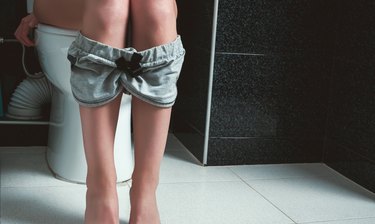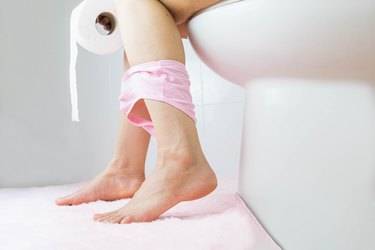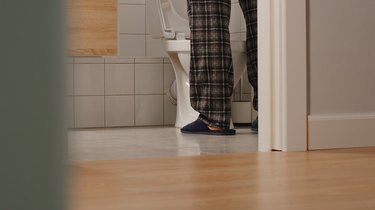
The appearance of your pee can say a lot about your health. So, if you sneak a peek in the toilet and notice your pee is as foamy as a glass of beer, you might be wondering what's up.
While an occasional case of fizzy urine doesn't necessarily mean anything bad, frequent frothiness can indicate an underlying health problem.
Video of the Day
Video of the Day
Here, Koushik Shaw, MD, a urologist at the Austin Urology Institute, explains why your pee looks like it just came out of the tap at a bar and what you can do to be free of the foam.
Wait, What Does Normal Pee Look Like?
When urine is normal, it’s pretty clear in color with a yellowish hue. And while it shouldn’t contain blood or foam, it may have big, clear bubbles that disappear once you flush, according to Northwestern Medicine.
Unlike benign bubbles, foam — which is abnormal — is white and can hang around the toilet even after you flush, per Northwestern Medicine.
1. You’re Peeing Super Fast
"Most often, foam in the urine can be caused by the speed of urine hitting water in the toilet," Dr. Shaw says.
He offers an analogy to illustrate the point: "When you are filling a bucket with a high-pressure hose, foam often gets stirred up when air mixes with the jet spray of water."
A similar thing occurs when your pee stream is strong.
Fix it: A powerful flow is NBD. Go ahead and pee as fast as you'd like.
2. There’s Too Much Protein in Your Urine
More concerningly, consistently foamy urine could be caused by high levels of protein in your urine, medically known as proteinuria, Dr. Shaw says.
Here's why that's a problem: "Most protein is filtered by the kidneys and re-absorbed into the bloodstream," Dr. Shaw says. "If the kidney-filter is damaged, however, protein can leak into the urine."
Diabetes, blood pressure problems and autoimmune issues can all lead to kidney damage and protein in the urine, Dr. Shaw adds.
Fix it: Don't blow off the foam in the bowl. Left unchecked, these conditions can be harmful to your health, so visit your doctor for a proper evaluation.
3. You’re Dehydrated
Sometimes, dehydration can lead to proteinuria and transiently foamy urine, Dr. Shaw says.
That's because when you're dehydrated, it can trigger a temporary spike in your pee's protein levels, according to the Mayo Clinic. And, as we know, excessive protein in your pee produces a frothy piddle.
Fix it: "Drinking more water should typically resolve this," Dr. Shaw says. "In general, you want to aim for urine that is 'lemonade' colored," he adds.
So, how much water you should drink per day? Try this equation:
Body weight (in pounds) ÷ 2 = minimum ounces of H2O you should sip a day
4. There’s Semen in Your Urine
If you pee with a penis, "'retrograde ejaculation' can be a source of cloudy or foamy urine," Dr. Shaw says. "Typically, this is semen mixed in the first one or two urinations after sexual activities," he explains.
Fix it: In most cases, this is just a temporary issue, and your urine should be foam-free after a few trips to the bathroom.
But if your frothy, post-sex pee persists, consult with your doctor, as this may also be a sign of a more serious issue, such as the side effect of certain medications, surgeries or diseases like diabetes, Dr. Shaw says.
5. You Have a Fistula
If you see a bounty of bubbles in the bowl (versus white foam) every time you go number one, this could be a red flag for a fistula, or an abnormal connection between two body parts (in this case, the bowels and the bladder), Dr. Shaw says.
When this happens, the bowels send gas into the urinary system, he explains. So, during urination, actual bubbles exit the urethra in your pee.
Fistulas could be caused by several health issues, including cancers of the bladder and colon or diverticular disease (pockets in the colon from chronic constipation), Dr. Shaw says.
Fix it: See your doctor, who can properly examine you and help you get to the bottom of the bubbles in your pee.
When to See a Doctor About Foamy Pee
"Transient foamy urine may occur from time to time," Dr. Shaw says. "However, if you notice a consistent change in your urine — be it smell, color or foam — see your physician for further evaluation" to rule out any serious health conditions.
Is this an emergency? If you are experiencing serious medical symptoms, please see the National Library of Medicine’s list of signs you need emergency medical attention or call 911.


